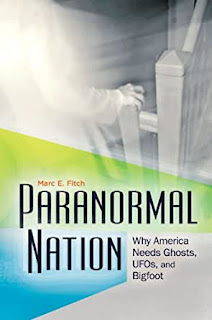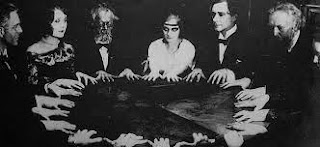Literature Review #5
Here is a picture of what is marketed as a “Premium Ghost Hunting Digital EVP Recorder” on Amazon. Upon closer inspection, this product is just an ordinary digital voice recorder.
https://www.amazon.com/Premium-Ghost-Hunting-Digital-Recorder/dp/B0888V7B9H
Axtell, Cassie C., "Assessing Electronic Voice Phenomena through Speech Science."
Honors Theses, Encompass, 2017, https://encompass.eku.edu/honors_theses/415
Axtell explores some of the history behind EVPs and analyzes the reliability of using EVPs as a method for ghosts to communicate with humans. She mentions examples of different experiments that show how interpretations of EVPs vary significantly between people, which indicates that EVP interpretations may not be accurate at all. She also applies the possibilities of apophenia and priming to ghost hunting and EVPs. Axtell further laments the lack of speech scientists and speech analysis during EVP interpretations; thus, all that ghost hunters have are listeners’ unreliable perceptions of EVPs.
I was unable to find much information about Cassie C. Axtell online. However, the source should still be considered scholarly, as it is her honors thesis for her Bachelor’s degree from Eastern Kentucky University. Thus, it was likely reviewed by a number of professors from this university.
Two key terms used in this source are “apophenia” and “priming.” “Apophenia” refers to how people tend to make patterns or sense out of nothing. In the context of EVPs and ghost hunting, “priming” refers to how prior knowledge of a so-called apparition can affect what paranormal investigators perceive, thus allowing the investigators to hear what they want to hear from recordings.
Quotes
1. “It has been proposed countless times that the paranormal entities heard on EVP recordings do so by manipulating the sound energy into a rough imitation of human speech as a form of communication” (Axtell 3).
2. Dr. Mark Leary of Duke University “concluded that investigators should hold some degree of disbelief in their interpretations in EVPs seeing as an average of only 22% of interpretations were shared across listeners” (Axtell 11).
3. “No societies reported any additional alteration or editing techniques outside of basic amplification and slowing of speed to enhance the intelligibility of the recording. Many report that additional edits lead to a distortion of sound, and ultimately less reliable interpretations” (Axtell 24).
This source is helpful because it explores the background of EVP as well as EVP practices today very thoroughly. Axtell provides a lot of statistical information about the accuracy and reliability of EVPs, which I was able to use in my paper. In addition, after revisiting this paper after my oral presentation, I was able to find that, according to paranormal investigation societies, paranormal investigators do not edit their EVPs beyond playback speed or basic amplification. I do not know how reliable this is, as this is coming from investigators themselves who may not be perfectly objective or honest, but I remember being asked about editing EVPs during my presentation.



Comments
Post a Comment